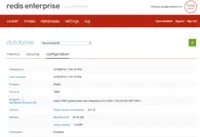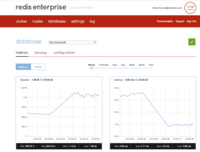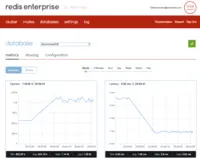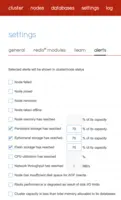Overview
What is Redis™*?
Redis is an open source in-memory data structure server and NoSQL database.
Awards
Products that are considered exceptional by their customers based on a variety of criteria win TrustRadius awards. Learn more about the types of TrustRadius awards to make the best purchase decision. More about TrustRadius Awards
Popular Features
- Performance (69)10.0100%
- Scalability (69)9.494%
- Availability (69)9.090%
- Concurrency (68)9.090%
Reviewer Pros & Cons
Pricing
Cloud
$388.00
Entry-level set up fee?
- Setup fee optional
Offerings
- Free Trial
- Free/Freemium Version
- Premium Consulting/Integration Services
Features
Product Details
- About
- Integrations
- Competitors
- Tech Details
- Downloadables
- FAQs
What is Redis™*?
According to the vendor, Redis is an in-memory multi-model database that supports multiple data structures such as strings, hashes, lists, sets, sorted sets with range queries, bitmaps, hyperloglogs and geospatial indexes with radius queries. Redis has built-in replication, Lua scripting, LRU eviction, transactions and different levels of on-disk persistence, and provides high availability and automatic partitioning with Redis Cluster.
Redis combines in-memory, schema-less design with optimized data structures and versatile modules that adapt to your data needs. The result is an adept, high performance, multi-purpose database that scales easily like a simple key/value data store but delivers sophisticated functionality with great simplicity, according to the vendor.
Redis also enables data persistence and high availability through replication and backups. Redis Enterprise is built from the ground up to serve as a system of record for any application.
*Redis is a trademark of Redis Ltd. Any rights therein are reserved to Redis Ltd. Any use by TrustRadius is for referential purposes only and does not indicate any sponsorship, endorsement or affiliation between Redis and TrustRadius.
Redis™* Features
NoSQL Databases Features
- Supported: Performance
- Supported: Availability
- Supported: Concurrency
- Supported: Security
- Supported: Scalability
- Supported: Data model flexibility
- Supported: Deployment model flexibility
Additional Features
- Supported: Integrated modules
- Supported: Active-Passive Geo Distribution
- Supported: Cluster Architecture
- Supported: Linear Scaling
- Supported: Durability
- Supported: Backup and Disaster Recovery
- Supported: Reliability
Redis™* Screenshots
Redis™* Video
Redis™* Integrations
- Apache Spark
- Red Hat OpenShift
- CData
- Pivotal Cloud Foundry
Redis™* Competitors
Redis™* Technical Details
| Deployment Types | On-premise, Software as a Service (SaaS), Cloud, or Web-Based |
|---|---|
| Operating Systems | Windows, Linux, Mac |
| Mobile Application | Apple iOS, Android, Windows Phone, Blackberry, Mobile Web |
| Supported Countries | Global |
| Supported Languages | https://redis.io/clients |

















